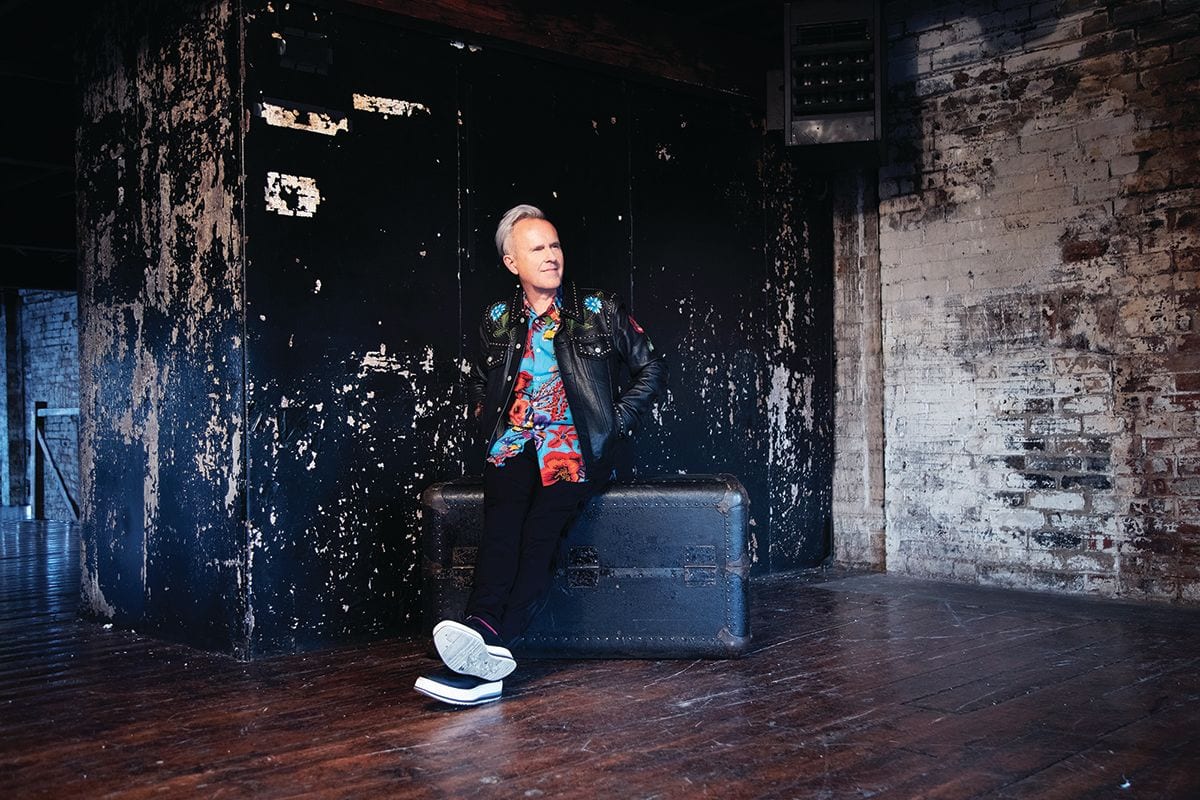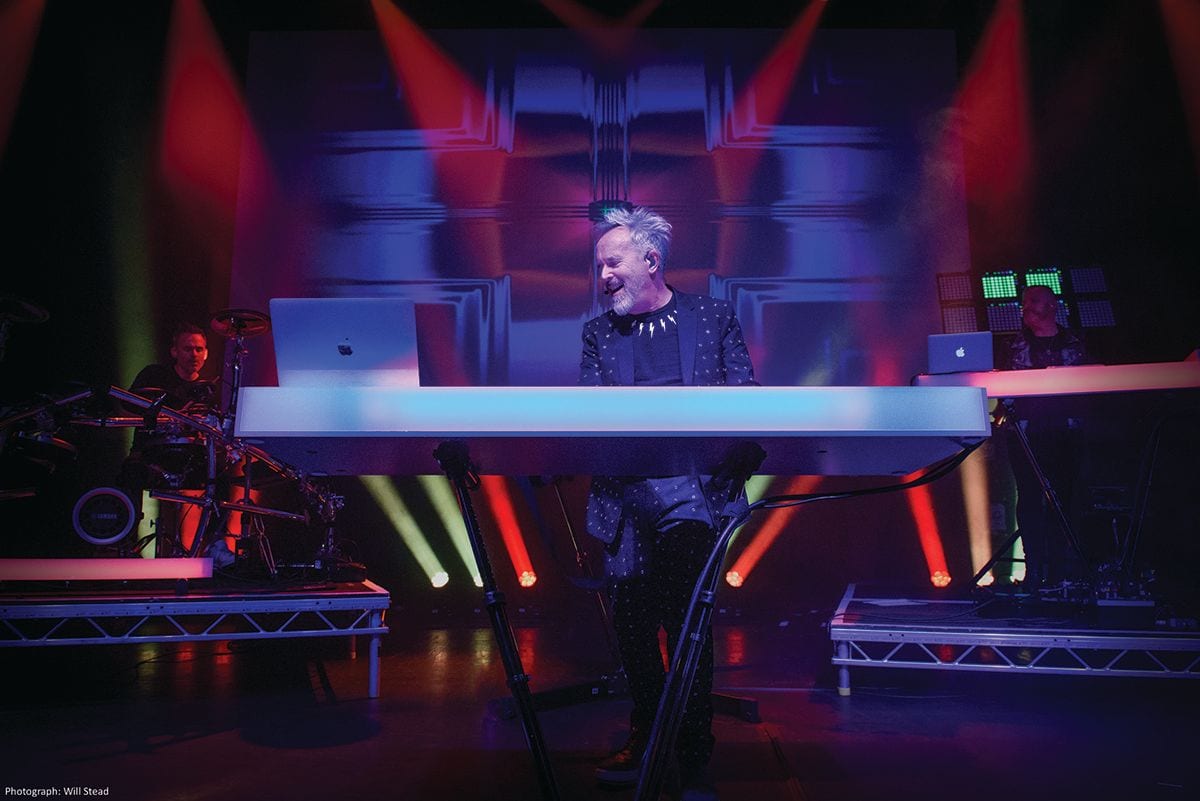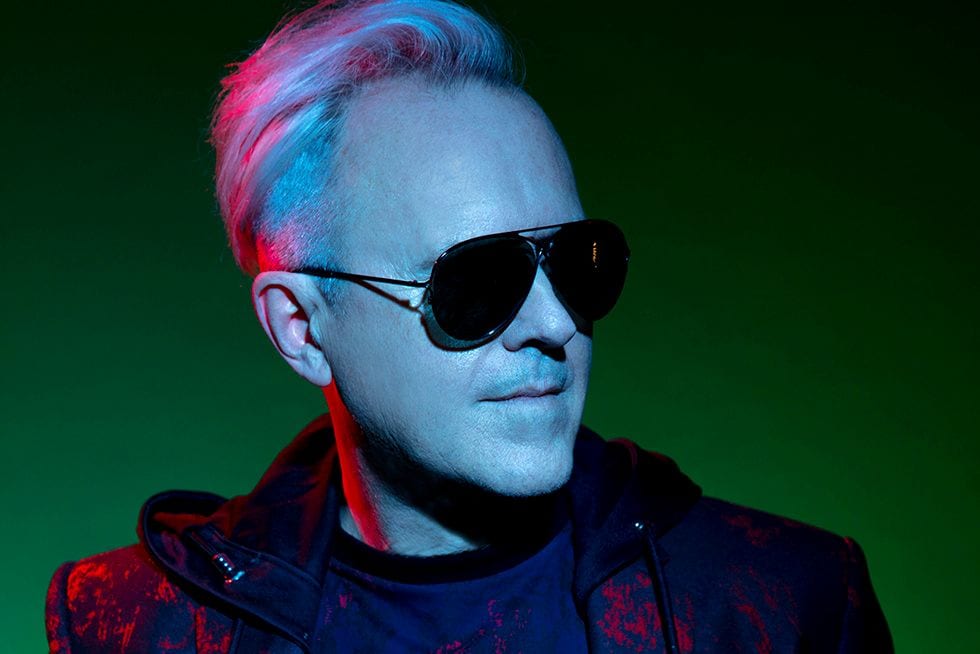
In 1979, a young and unknown British musician named Howard Jones—who had previously trained in classical piano and was a member of a hard rock band called Warrior—came across an instrument that would forever change the direction of his music. One day as he and his then-girlfriend (and now wife) Jan were selling produce from the back of their van, a runaway car hit the van and injured Jan. The insurance money from the accident was used by Jones to order a synthesizer (the store mistakenly sent two synths, and Jones returned the extra one). He then began performing with a synthesizer at clubs in and around the English town of High Wycombe. Although there had been electronic-driven hits by the likes of the Buggles (“Video Killed the Radio Star”), M (“Pop Muzik”), and Tubeway Army (“Are Friends ‘Electric’?”) during this period, synthpop was still in its infancy in terms of wider mainstream acceptance amid rock and disco.
“I was out doing gigs three to four nights a week,” Jones says today. “I was playing tiny clubs and pubs and experimenting with this new gear and this one-man show idea. I could see the reaction in front of me of the audience going, ‘Wow, we want to get behind this; this is really exciting; it’s music of our time using the technology of that time.’ My proof was seeing people digging the music and coming back to the next gig. So that was my inkling that it was possibly going to work.”
Jones and many other up-and-coming British pop acts were certainly on to something about synthesizer-driven music’s potential. A few years later, they exported synthpop to America that became popular from the early to mid-1980s. Jones’ debut album Human’s Lib (1983) yielded the singles “What Is Love” and “New Song”, launching a career that included many more hits throughout decade: “Things Can Only Get Better”, “Life in One Day”, “Like to Get to Know You Well”, “No One Is to Blame”, “You Know I Love You, Don’t You?”, and “Everlasting Love”. In addition to touring, he made several high-profile appearances throughout his career, including Live Aid and the Prince’s Trust concerts.

Forty years after that career-changing purchase of a synthesizer, Jones is still making electronic-based music—although he has expanded his sonic palette to include acoustic piano, orchestral, and choir music. His brand new album, Transform, has all the elements of classic Howard Jones: dazzling synth sounds, catchy melodies, and introspective and life-affirming lyrics—but with a contemporary feel. The stylistic tone of the record varies between danceable tracks like “The One to Love You” and “Stay With Me”, and reflective songs such as “Beating Mr. Neg”, the title cut, and the beautiful ballad “Mother”.
This summer he’s bringing the music of Transform and some selections of his back catalog for a tour of America, starting on 6 June. Opening for him will be fellow 1980s synthpop act Men Without Hats (of “The Safety Dance” fame) and the electronic duo All Hail the Silence. In this new interview with PopMatters, Jones talks about making Transform, the special milestone surrounding Human’s Lib, and what he would like to do next for an encore.
* * *
Transform is your first new collection of studio songs in a while, and the follow-up to your previous collection Engage. How do you feel about its release?
I think it’s one of my best albums. Thirty-five years into the career, I’m so pleased to be saying that. It’s the sum of everything I’ve learned over the decades. I’m not trying to compete with anyone. I’m just trying to be Howard Jones and the best version of that that I can do. I’m really proud of it.
Can you describe the writing and recording process for the album?
I think it’s taken me about two years. I started with two songs that I wrote for a film called Eddie the Eagle. I was asked by [Take That’s] Gary Barlow, who was putting the music together for it, to write a couple of songs. Because the film was set in the ’80s it had to have an ’80s flavor, but it needed to be a contemporary song. I realized how much fun that was to do, and that started me thinking, “I want this to be the basis of the album.” The thinking was songs, loads of synths—almost going back to my roots when I started with Human’s Lib. Then I did the three collaborations with [electronic musician] BT as well, which are a big part of the album. That turned out really well. I took some time off from touring to get my head down and concentrate on making a record that hung together as a piece rather than be an eclectic collection of different things.

This new album represents a return to your synthpop, whereas your previous album Engage was more experimental and eclectic-sounding.
That’s a great way of putting it. Engage was kind of like doing a multimedia show and also experimenting some of the forms of music that I really like: classical and some ballet. Engage was the first part of four albums. Engage was the first, Transform second, there is another two coming in the next five years. I’ve got a plan! (laughs)
Did you already have an idea what you wanted Transform to sound like prior to recording it?
I wanted it to be a synthpop album, to sound like it was made today but also to have references to my heritage. Obviously technology is wonderful now, but it’s got a lot of my trademark things in there, The fans were begging me for a synthpop record again, and so far the reaction from them has been wonderful—the few tracks they heard online, they’ve been going crazy for it (laughs). If it makes one person happy, then I’m fulfilled.
Your songs always carry a humanistic and positive message in them. Is there a theme that runs through Transform?
It’s based on the idea that if we want to change the world for the better, then we have to start with ourselves. We need to work on improving our thinking, about how we interact with the world, how we behave—rather than leaving it up to everyone else. It’s got to start with us. That was a thread that I tried to stick to. It comes in very different disguises.
The track “Beating Mr. Neg”, for instance, is about the negative voice that sits in our soul and tells us you can’t do good, trying to disrupt all of our amazing potential that we all have. So that’s the idea of recognizing that everyone has that—we must battle with it and win.
I suppose a song like “Mother” would fit in that category because I wrote that on behalf of everyone on how we may feel about our mothers, even if we didn’t have the most perfect relationships with them, but we still have that incredible connection that we’ll always have. My mother passed away three years ago now, so I waited to write that song. But it was really written on behalf of everyone. That’s what songwriters should do—they should articulate the feelings that everyone has, so everyone can know we all feel these things.

Amid the very personal songs, there are some very danceable and soulful tracks on Transform, including the last one, “Stay With Me”.
It’s slightly rogue in terms of the sound of the rest of the record. I didn’t know where to put “Mother”, because everyone who hears it ends up in bits. I wanted to end the album on an up, celebratory way. And I love all that chopped-up granulated sound, so I thought that was the way to end the album on a big high.
You’re going to be touring the States during the summer. What can fans expect at the shows, both musically and visually?
I want to play a lot of the new tracks. I’m probably going to play seven or eight tracks from the new album. And then in between those tracks, I’m going to put one of the heritage songs. What I’ve been doing is going back to the old songs and updating them sonically a bit and adding a few extra new parts, putting them in line with the new album. Hopefully, it will feel seamless, going from old to new and back on again.
Then I’ve been working hard on the visuals. We’ve done lots of filming. So for instance [in] “Beating Mr. Neg”, the character Mr. Neg looms behind me…and in the end I defeat in a non-violent way (laughs). And then we got a great piece for “The One to Love You”, which is a contemporary dance. We found these amazing dancers because I’m a big fan of contemporary dance. I go see a lot of it up in London – so there’s that. And there’s a theme running through a bit with A.I. and robots, so they’re doing some of the backing vocals as well on the screen. I love working on the visual side of it. I love presenting a show to people because it’s fun to do that.
This year marks the 35th anniversary of your debut album Human’s Lib that kicked off your recording career. What are your thoughts about that milestone?
It seemed to have stood the test of time quite well. I still love the record myself and think it sounds punchy and it’s full of energy. It means a lot to me because it was the first record. I loved making it. It was born from playing those songs for years in front of the fans. What I’m pleased about it is that I still feel as excited about what I am doing as I did when I started. I love doing this, and it’s like my role to do this. The passion is still there. When musicians lose that passion, you can feel it. I never want to be going through the motions. I want to be out there believing in the work and feeling a great passion for it.

Looking back, the ’80s British synthpop explosion in the States was an exhilarating time in music. It seems to have now gotten some respect over 30 years later.
The ’80s did get a bad name. I don’t why that was. But it’s come through that, and people now appreciate it. It was a golden era of pop music: people trying to do something different and new. It wasn’t really rock and roll—it was a bit artsier than that. We had videos to present visual ideas. I’ve been saying this a lot recently: my big thing was getting on the radio. Some people wanted people to hear the whole album at home and thought it was uncool to be on the radio. Me—no way. I grew up listening to the radio, and I wanted my music to be heard on the radio so that people could listen to it in their car or doing daily life. People still play those records. I may not have sold as many albums as some people, but I became a little more part of the culture because you could hear those songs on the radio.
Throughout your career, you have not only performed and recorded electronic-driven pop, but also acoustic songs on piano. What would you like to do next as far musical projects go?
I’ve been thinking now for a few years that I’d like to do an orchestral album, that it would be just purely piano and orchestra because I have a lot of songs that would suit that. It’s about learning, how to work in different ways in different genres. And then that all feeds back to when I do another synth album in the future, I’ll hopefully have developed as a musician as an artist, and I can bring what I have learned from that back to my core work, which I suppose is the synths. I’d like to experiment…because for me, it’s meant that I have been able to have a 35-year career. I know my fans will go, “Oh what’s he doing now?” (laughs). But that’s who I am. I don’t like to stand still and do the same thing over and over. I want to stretch out and learn about new things. I’ll probably always be like that.

